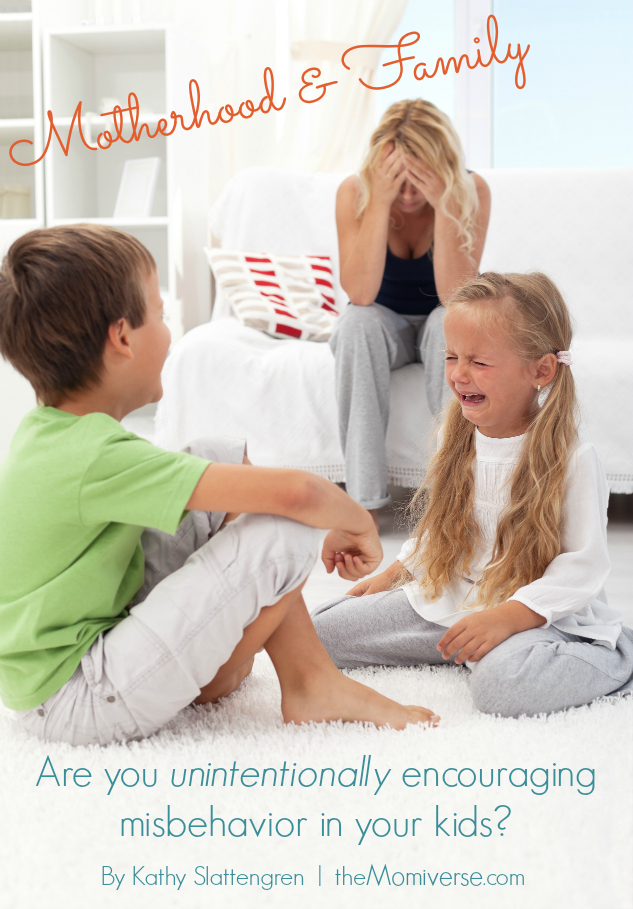Do you ever feel exasperated with your children’s continued misbehavior? If so, you’re like many other parents! You may even feel like shouting at your kids, “Why can’t you just behave!”
So why do your children behave the way they do? According to the late psychologist Alfred Adler, all behavior serves a purpose. The most basic purposes are for two things:
Belonging – feeling a sense of connection
Meaning – feeling a sense of significance
When your kids are misbehaving, they often feel a greater sense of connection to you because you pay a lot of attention to them. They may also feel a sense of significance because they know how to push your buttons and make you react. Now there’s some power!
Let’s look at how this works in a few situations.
My children don’t listen
Do you ever find yourself repeating the same thing multiple times before your children actually listen? Children who don’t listen have often been unintentionally taught not to listen.
How do you teach your kids not to listen? You reinforce not listening whenever you ask your child to do something but then don’t immediately follow through when your child ignores the request.
For example, a mom and 8-year-old daughter were out for a walk. There was a grassy bank next to the sidewalk and the girl walked up on the hill. The mom told her “Don’t walk in the wet grass.” The girl continued walking along the hill for another minute or two before the mom continued “I asked you to get off the wet grass!” The girl still didn’t respond and so the mom, now irritated, began counting “That’s 1, 2”, and before she hit “3” the girl was back on the sidewalk.
This girl typically waits until her parents are angry before she pays attention to their requests. This behavior gets her lots of her parents’ attention!
If you make a request and your child ignores it, you need to take action. In this example, the mother could have walked up the hill, taken her daughter’s hand, and led her back to the sidewalk.
My children fight with each other
Sibling rivalry is another common complaint. How do you react when your children are fighting? When kids can get you involved in their fights, they feel a sense of connection to you and also feel significant – fulfilling Adler’s two basic purposes of behavior!
If you’re not afraid of your children hurting each other, then the best approach is to let them work it out on their own. The less attention you give their fighting, the sooner it will end. If their fighting bothers you, ask them to take it outside or to the garage. An uncomfortable location will shorten the fight!
Another approach is to remove yourself by doing something else – like going outside to work in the garden. When you avoid getting involved in their fights, you also avoid adding fuel to the fire.
My children have meltdowns
No parent wants to deal with tantrums and meltdowns – and yet all children will exhibit this behavior at some point. Tantrums are a dramatic way of getting your attention.
When your child has a meltdown, he is flooded with emotion and he is not engaged in rational thinking. If you react to a meltdown by giving in or providing a lot of attention, you will reinforce the behavior. Instead, if you stay calm and allow your child time and space to calm down, your child will learn how to soothe himself and gain emotional control.
My child has a bad attitude
What’s your reaction when your child does something like rolls her eyes at you? Do you respond with a command like “Don’t you roll your eyes at me!” If so, she’s getting some attention from you and knows how to get more attention whenever she wants it.
Instead of fueling this behavior, you could calmly say, “I’ll be happy to talk to you when you are being respectful” and walk away. By telling her what you are going to do instead of what she has to do, you can make it happen.
Consider your role
You can only change your own behavior. However, when you change your behavior, the behavior of your children will also change.
In fact, if your child is typically successful with a behavior like nagging, her nagging may initially increase when you stop responding to it. Children will try very hard to provoke the old response from you. But if you stick with your new response, they will learn that nagging no longer works with you.
Take a step back and consider how your reactions may accidentally encourage the very behavior you do not want to see in your children. Try changing your behavior so that your kids experience plenty of connection and significance with you and do not resort to misbehavior.
Have you tried changing your behavior? How did it change the behavior of your children?
Photo source: Ilike, bigstock.com
This Week's Articles Read, learn, live
-
 Summertime grilled vegetables
Summertime grilled vegetables
-
 5 Ways to make this summer full of unforgettable family fun
5 Ways to make this summer full of unforgettable family fun
-
 10 Reasons to take a family vacation in Puerto Vallarta
10 Reasons to take a family vacation in Puerto Vallarta
-
 5 Fun tips for spring cleaning with kids
5 Fun tips for spring cleaning with kids
-
 10 chick flicks with New Year’s Eve scenes
10 chick flicks with New Year’s Eve scenes
-
 The day after Christmas: 5 ways to handle the biggest downer of the year
The day after Christmas: 5 ways to handle the biggest downer of the year
